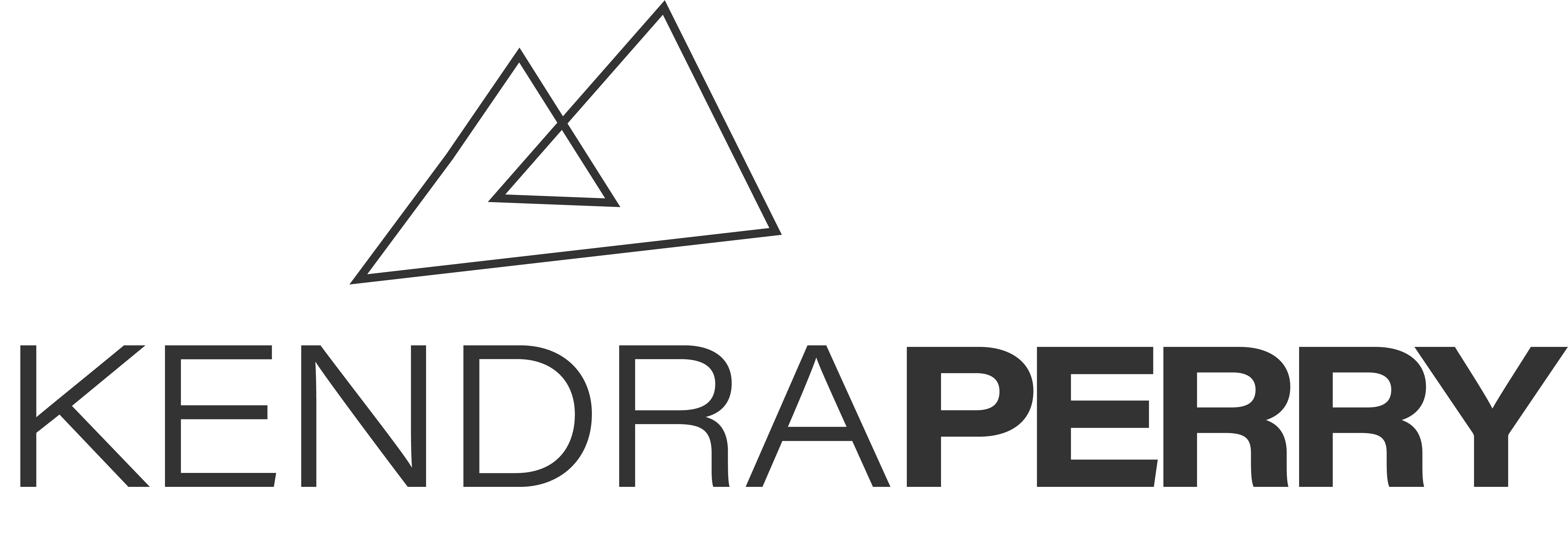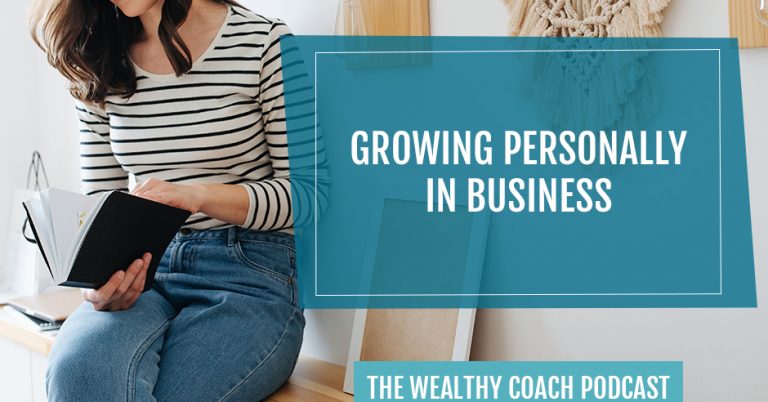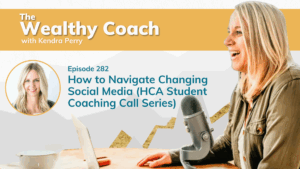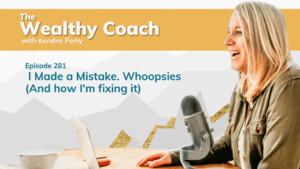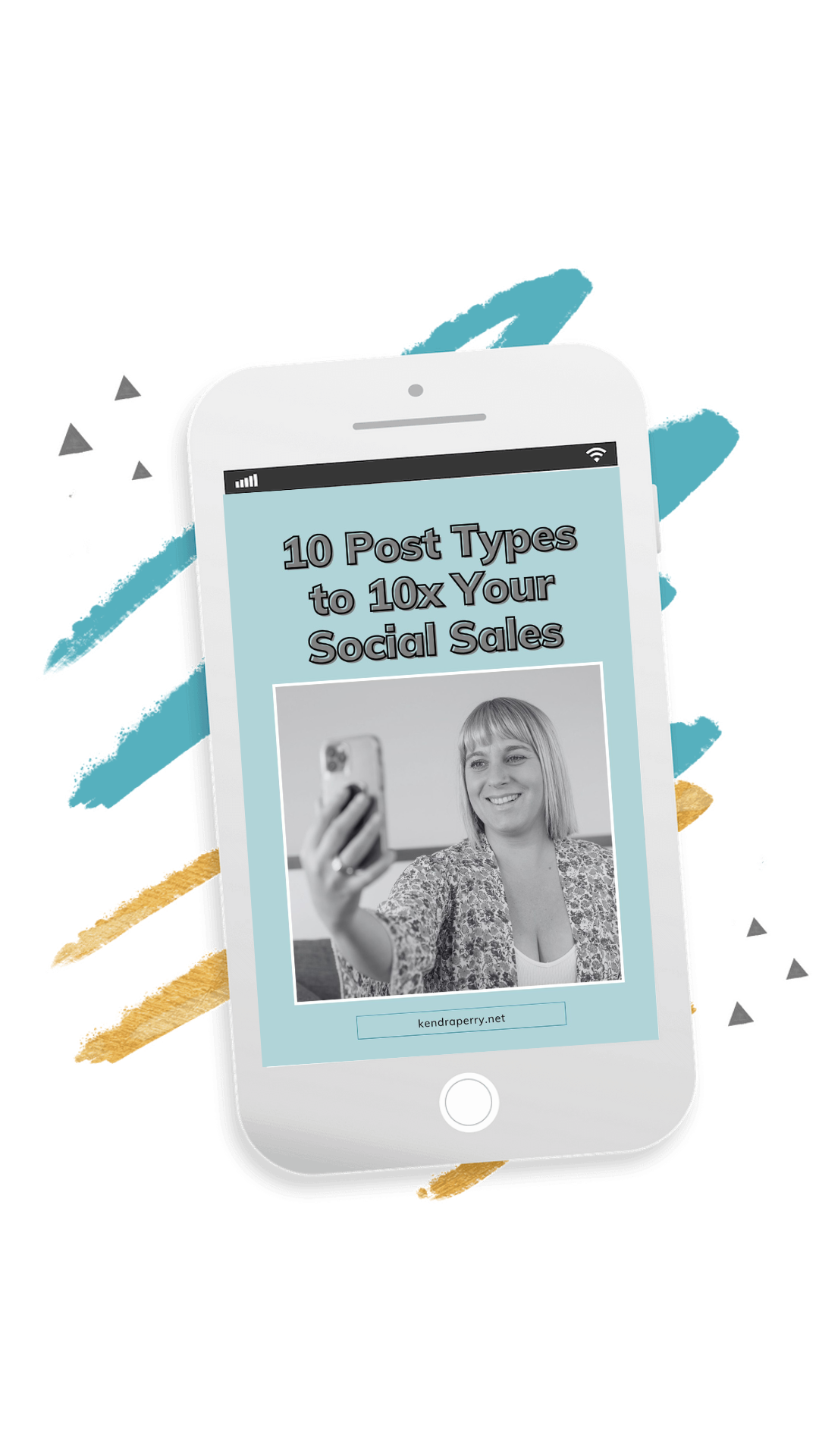Does building your business TRIGGER you?
Maybe it’s a mean comment, someone doesn’t say “yes” on a sales call (even though you thought it went so well), you pour your heart and soul into an IG post, and you get crickets, or a client complains about your program. These can all be things that can trigger you!
There are one million and one reasons to get triggered each and every day in business. Not many new coaches know this but building a business is THE BIGGEST course in personal development you will ever do. That is why it’s hard.
In today’s Wealthy Coach Podcast, you’ll hear me discuss the personal development journey that is building a business that I recorded on Guru Please Podcast.
We discuss:
My vision and my beliefs for the world
My daily self-care routines
How to have boundaries in work and life and turn things down
Why branding takes personal development
About letting go of judgment by others
Which mindset obstacles you want to be aware of
How to value your products and services
How to identify if you have imposter syndrome
Mindset is just one piece of the puzzle when it comes to growing your business and reaching that $5k a month goal. Need more? I am going to be launching my program, the Health Coach Accelerator program, soon and want you to be a part of it! Get on the VIP list: https://go.kendraperry.net/hca
Connect with me on Instagram @kendraperryinc
—
Send in a voice message: https://anchor.fm/thewealthycoach/message
Support this podcast: https://anchor.fm/thewealthycoach/support
Listen to the podcast here:
Growing Personally In Business
I have an exciting announcement. My brand-new group program Health Coach Accelerator is opening up. If you’re a health coach or wellness practitioner who isn’t generating $5,000 per month consistently then this is exactly what this program is going to help you do. I’m going to teach you the only things you need to implement in order to get to those sustainable $5,000 months. If we’re being real, there’s a lot of noise online and your time is limited so we’re only going to focus on the things that matter. No extra so that you can start enrolling new clients and getting dollars into your bank account as soon as possible.
Inside the program, we will identify your specific and profitable niche. We’re going to develop your unique brand identity so that you stand out online. We’re going to create your signature method, price it for profit, and sell it like a boss. We’re also going to get your freebie set up and your email list set up so you can start generating leads and growing your following. If you want your business completely solid and ready to go then let’s do this. Get on my VIP list by going to KendraPerry.net/hca. As one of my founding members, you’re going to get bonuses and discounts not offered ever again. When I relaunch this program, it’s going to be significantly more expensive. The time to get in is now.
—
This episode is a fun one with Kendra Perry, who’s a business coach for health coaches. This episode is perfect if you have your own business, if you have an online business, if you’re a coach, or if you’re generally interested in the principles of business and learning about money mindset, imposter syndrome, and how to value yourself and your work. We also go into what she does for her own health being a former health coach, including how she takes care of her physical and emotional health. She’s got a style that I would say is real, no BS, and very straightforward. If you’re into that vibe, keep reading.
—
I would like to introduce Kendra. She is a former functional health coach turned online business strategist. She’s helped over 200 health coaches grow their practices, track clients and blow up their bank accounts. Welcome to the show, Kendra.
Thank you so much for having me.
I’m glad to have you on and I wanted to get started by asking you how the industry looks right now in terms of what health coaches are facing during COVID-19?
It’s a time for health coaches to shine because with all this craziness going on lately, I think people are thinking about their health. Unfortunately, the mainstream media does a poor job of helping people take responsibility for their own health, but people are considering their health, maybe their immune system, more than they were before. That’s where health coaches can come in. Despite what the government tells you that you need to be healthy, you need a lot of things to be healthy. You need to consider diet, sleep, exercise, happiness and sunlight. That’s where health coaches can help people take responsibility for their own health feel better overall and lead more healthy lifestyles.
You show health coaches how to jumpstart their business, even from scratch with no money. How does one do that? Is there a step-by-step process or does it depend on who you’re talking to?
I love the idea of building an online health coaching business because you can start it with very little money. I probably started my business when I was a health coach for less than $300. It’s nice because you don’t have to have a lot of money in the bank. I was in a bit of debt when I started my business. Depending on who you talk to, there are a lot of different ways that you can build a business, but there is a step-by-step process. It’s actually something I teach called the Health Coach Accelerator method. When it comes to building a business, sustainability is key. A lot of people build businesses that they end up hating or that end up burning them out and that doesn’t work.
How do you create something sustainable?
There are a few key things for sustainability and one of the first things is identity. Knowing who you’re talking to. A lot of health coaches that go get their health coach certification, and this is probably true for other industries, they’re like, “I’m so passionate about this. I bet I’m going to tell the world I do this and people are going to come running.” It doesn’t work like that. When you’re trying to help everyone and you’re trying to talk to a million different people, your message gets diluted. You often feel all over the place. You are trying to create too many different types of content. You’re confused about what you’re supposed to be offering and what you’re supposed to be creating and that can lead to a poor, sustainable business model. That identity piece, getting specific with who you’re talking to is important.
The next thing in terms of sustainability is moving away from selling one-off sessions, or single sessions and creating a method, a system or a framework. Something that your business is known for because the truth is, if we’re just selling single sessions, we have to sell a lot of them. We get very little commitment from the client because they’re not paying much for that. There’s a good chance that you’re not going to get return customers.
When you sell a method, a system, or framework and package it nicely into a program, you have to sell a lot less and so you’re hustling a lot less for clients. When you sign a client, they’re paying more money so they’re getting that commitment, which is great, because the people who are committed are going to get the results. You get that client that transformation. When we get someone to transform, obviously, they’re going to recommend us and refer us. Possibly the hope is they’re going to want to continue to work with us. We want to create a business model that focuses on return customers and customer loyalty. We don’t want to keep having to hustle to find new people when we could resell to the people we already have.
It sounds like a lot of what you show coaches is switching their mindset about certain things. It takes a different way of thinking about a business to go from one-off products to creating a more long-term system or program for people. That would make a big difference in their business as a big picture moving forward.
It is a hard shift probably because a lot of us that’s the business model we’ve likely experienced within health and wellness. We see a naturopath. We see a Chinese medicine doctor. We go to an osteopathic doctor. We’re buying one session. We’re typically not buying multiple sessions at a time. For health coaches, they put themselves into that box where they think that that’s the business model they’re supposed to be following. A big problem with this is that health coaches are going to be unlicensed, whereas your naturopathic doctor, your Chinese medicine doctor, your osteopathic doctor, they’re licensed and a lot of people’s extended health coverage will cover the cost.
Those people can rely on that alone to get them busy. They don’t have to do a lot of marketing. They can be the go-to person because people are always happy when they don’t have to pay for things right. Of course, with unlicensed professionals like health coaches and other types of health and wellness practitioners. We can’t rely on that and therefore you have to do a lot of marketing. You have to put effort into that. If you’re just selling that one-off session, you’re burning yourself into the ground.
You teach what you call the No BS Approach for Health Coaches and Practitioners. What is the BS that is out there?
My personality is kind of blunt. I don’t like to sugarcoat things. I’m a bit harsh in the way I teach things. I’m not a nurturer. I’m not a coddler. I like to just tell people upfront what I think about things and what I think about what they’re doing. That’s basically what I’m referring to with the no BS approach. There’s nothing wrong with being softer, more nurturing, and coddling a little bit more, but it’s not my style. I don’t like to dance around things. If you want to know what I think, I will tell you.
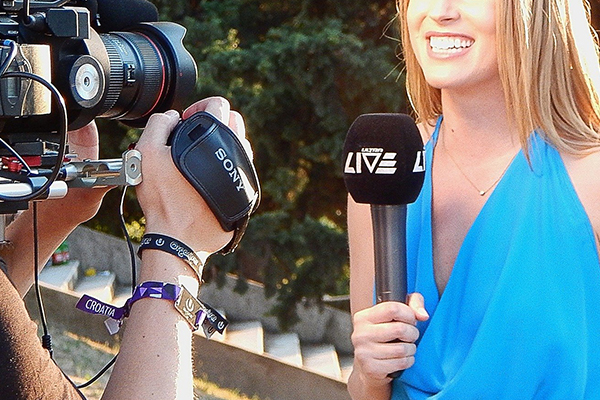
I can imagine that some take that better than others.
For people who aren’t into that, I’m not their person and that’s totally okay. We can’t make everyone happy. For me, it’s important to run my business with authenticity and integrity and truly, that’s who I am. If you hung out with me in person, like that’s my personality. I find it much easier to be myself rather than pretend to be someone I’m not.
Do you feel like you are the same person when you’re operating your business versus outside of the business?
I would say, to some degree, how I am online and in my business is just a piece of who I am. We’re all very complex individuals with a lot of different layers to our personality and who we are. We can’t truly bring across everything that we are into this online platform or medium that we portray ourselves in. I would say that it’s very aligned. Who I am online is a strong piece of who I am offline.
Because you used to be a health coach, you see the mistakes that people are making, or things that they can improve upon or optimize. What drives you to do what you do now? What gets you excited in the morning when you wake up and you’re like, “I’m going to keep going in my business?”
Health coaching is the key to saving the planet, which sounds crazy, but I truly believe that. I feel like there’s a lot of craziness going on in the world. There’s a lot of pain, suffering, anger, and division. People attacking people. Obviously, there’s a lot that goes into that but having strong health and foundation of who you are, and being healthy and feeling good when you wake up and understanding how to manage your nervous system and your emotions. These are all important pieces to people being their best possible selves. That’s what health coaches help people do.
They help people not only with their physical health but with their emotional health. A lot of times, when we improve our physical health, it carries over into our emotions and how we perceive the world. Personally, when I wasn’t doing so well with my health, I felt anxious and angry. I had a hard time being social. I would drink a lot, I would do a lot of drugs in order to gain that confidence that I didn’t have. When I shifted things with my health physically with diet, sleep, and exercise, but also with learning how to manage my emotions and addressing trauma. It shifted how I show up in the world, how I treat people, how I view people and how I feel on a daily basis. I believe that if people can address those things about their health, it will truly shift the global consciousness of the planet.
People are quite ill and that seems to be normal in society, or at the very least not something we particularly focus on and allow to become more chronic conditions that if unaddressed, will only grow in severity. How are you taking care of your health now? Do you have daily practices or weekly things that you do?
I’m not a super strict routine person. I have a menu of which I choose from daily in terms of self-care. I’m focused on eating healthy food. I’m lucky in the local community that I live in. There are a lot of farmers and local growers. I do eat the majority of my food from local sources, which I feel helps me stay balanced. I’m a very passionate outdoor enthusiast. I spend a lot of time in the mountains and on the water. I have easy access to these things.
I’m a privileged and lucky individual. I go out on my paddleboard on the lake and get that outside time. I get a lot of sunlight. I get a lot of natural outdoor time. I focus on my eating habits. I’m a Nazi about sleep. I want to be in bed between 9:00 and 10:00 every night. That’s important to me. I’ve worked a lot on my emotional health. It’s important for me to meditate and do breathwork in the morning, to get outside and journal. I see a couple of different counselors and energy healers regularly because we all got our crap.
I love that you do bring up that emotional piece and it’s not just physical bodily health. I do want to talk about creating boundaries and protecting your energy. What does that mean? What could that look like?
We have two types of boundaries. We have boundaries with other people and we have boundaries with ourselves. Boundaries are a challenge for everyone because not only do we have to know what our boundaries are. We don’t learn what our boundaries are until they’ve been broken. We also have to follow through with the consequence of that boundary being broken. This is important in business and in personal life.
If you’re going to have a boundary and you’re going to stick to it, you not only need to know it, but you need to express to the other person what that boundary is. If that person breaks that boundary, you need to follow through with the consequences. I’m going to use a random example. Let’s say a boundary is, you don’t smoke inside my house, and then you come to my house and light up a cigarette. I tell you that, “You don’t smoke inside my house. If you want to smoke, you go outside.” I stated the boundary, but now you’re inside, you’re smoking the cigarette. If I don’t follow through with the consequence of that boundary, which means that I’m kicking you out of my house, then you’re going to continue to break that boundary over and over again because I haven’t stood strong against that boundary.
There are a few layers to boundaries but within our society, we are conditioned to be yes people. To say yes to everything and we feel bad when we say no. We’re people pleasers. We want to make everyone happy. I think that’s especially true for women. The problem with that is if we say yes to everyone, then we’re saying no to the things that maybe we want to do and the things that make us happy. The truth is, we do have limited time in the day. Creating strong boundaries with the people around you is important, but also figuring out what your personal boundaries are because we overstep boundaries within ourselves a lot.
When it comes to creating boundaries, the way that we can figure out what our boundaries are, is to determine what our core values are. What’s important to us and what are non-negotiable. There are going to be 5 to 10 core values that are important to us. If anyone reading wants to do this exercise, you can google a list of core values and find hundreds of core values and choose your top 5 to 10. Anytime you’re presented with an opportunity in business, or maybe someone asking you to do something in your personal life, ask yourself, “Does this align with my values?” If it doesn’t, it’s not something you should be doing.
Sometimes it’s hard to turn something down because society tells us, “This is something you do want to do.”
Society conditions us to be workaholics, to be overachievers and to be busy. How often do you ask someone, “How are you doing?” They say, “Busy.” It drives me crazy. I’m like, “No, I asked how you were.” Some people like being busy but if you’re busy, and you don’t like being busy, you have no one to blame but yourself. Obviously, there are certain circumstances that we can’t help, and maybe in the times of COVID, it’s not necessarily people’s fault, especially moms who have to homeschool their children and build a business at the same time. Maybe there’s an exception there but we do have to whittle down our priorities.
It’s difficult because we do feel like we’re letting people down or we do get FOMO, Fear Of Missing Out. In business, we feel like we’re going to miss out on money. In business, it’s a tough thing because we’re often presented with opportunities that will give us money in the short term but may not help us reach our goals in the long term. You are a true entrepreneur and you’re on your way to being successful when you start turning down money in order to pursue the long-term goals in your business.
Do you help people identify the long-term goals upfront when they’re just starting out?
Absolutely. That’s a core piece of branding and this is the identity piece of my Health Coach Accelerator program. In order for you to be properly branded, you’ve got to know who you are, which means you need to know your values, and you need to know your goals for the future. For example, if you come and follow me on Instagram, you’ll get a good idea from just watching a few of my stories about what’s important to me and what my values are. That oozes through my personal brand. You’ll also have a good idea of what my goals are. You’ll hear me talk about wanting to shift the collective consciousness with health coaching, and you’ll know about the goals that I have for my clients. That’s important because that’s how people are ultimately going to connect with us. They are going to connect with people of similar values, and they’re going to potentially resonate with your goal.
It does come back to, “Who are you?” “What values are you promoting through having a business?” “Why are you even doing this? What’s in it for you?”
Branding is a tough thing because a lot of us don’t know who we are. This was my thing too. When I started my business, I had no idea that building a business was such a deep dive into personal development. It’s the most complex course and personal development you will ever do. Building a business is about finding out more of who you are, and what you want to portray to the world, and how you want to show up. It takes time and our personalities and who we are, evolve over time, and so does our business and our brand. It’s not a static thing but when I teach branding, it’s hard for people because it’s a deep dive into like, “Who are you? What’s your personality? Why do people love you? Why do people want to hang out with you?”

It takes a lot of vulnerability and wanting to share who you are. One of your Instagram posts caught my attention. What if your content offends someone or disappoints your mom? A lot of us have that conundrum come off like, “I want to share this, but not to my aunt or not to that one friend back in high school who we hung out a couple of times.” What’s your advice on that?
It comes down to getting really laser-focused on what you’re here to do and who you’re here to help. My mom is not my ideal client. I love my mom, she’s not my ideal client. My mom hates that I swear, she’s not my ideal client. She’s like, “I love your stuff but I wish you wouldn’t swear so much.” I’m like, “Mom, you’re not my ideal client. Sorry.” We have to get devoted to the people who we want to serve and forget about the other people.
It’s hard because ultimately, a lot of us are afraid of judgment. We don’t want to be judged, but the problem is that everyone judges all the time. We’re both judging each other right now and everyone reading is judging us, and they’re judging other people. We just judge. It’s not a good thing or it’s not a bad thing, we just all view the world a little bit differently, based on the experience that we’ve had in our life. No matter how you show up online, whether you try to be the least offensive person possible, you’re still going to get judged, and someone’s probably going to be offended. We can’t control other people’s perceptions of us. We can’t control what they think of us. Truly what people think of us is none of our business anyway.
If we can let go of our care of judgment, then we will truly be free to support the people that we show up to support. It’s tough because there are going to be people in your audience who don’t like what you’re doing and even if you try to please everyone, people are still not going to like it. It’s best to show up and teach what you want to teach. Show up as who you are, and try to be okay with the fact that some people aren’t going to like it.
Focusing on who do I want to reach and knowing that not everyone is in that category. Maybe even most people aren’t going to be the ideal client.
It takes time to whittle down your ideal client over time and start to attract those people. When we first start out, we might have a mismatch of people in our audience. As we get more specific and learn more about who we’re trying to help, those people are going to unfollow us. That’s just the way it is and it’s completely okay.
What other things are people running into like mental challenges and obstacles that with a mindset shift we can do better in our businesses and feel more secure and feel like we’re taking it somewhere?
In terms of blocks, there are many different mindset blocks. Mindset is the key to be able to run a successful business. I’ve heard someone say this, I don’t know what it’s based off, but I’ve heard that it’s 80% mindset, 20% strategy and I 100% agree. That’s why in my Health Coach Accelerator program, I start with the mindset because I’m like, “We’ve got to get the mindset first. You’ve got to at least become aware of these blocks.” Money mindset is a big block that people come across. Especially in health and wellness because most coaches, health coaches, and health practitioners decided to pursue this profession because they had their own struggles. It’s definitely true for me.
I didn’t mean to get so obsessed with health and wellness, I struggled personally with my health. That is true for a lot of people who are doing this. Either personally, they had an experience, maybe a spouse or a child. I don’t know if a lot of health coaches become health coaches necessarily to get rich and make money. I did, but for a lot of people, they want to help first and foremost. There might be this sliminess that they feel when it comes to taking money from people who need help. There’s a lot of money mindset things so I find a lot of health coaches undervalue their services. They charge way too low or they assume that their clients can’t afford things. I hear this all the time in business, “My clients can’t afford that.”
Maybe let them decide.
Don’t become a fortune teller. You don’t know what’s inside your clients’ bank account. The only bank account that you truly know is yours and that’s the only one that you should be focused on. It’s not up to you to determine what they can and cannot afford. Some people who are very unassuming can afford a lot. The truth is people will pay for what they see value in. People spend a ton of money on stupid crap all the time.
This is health we’re talking about.
If you are coming up across the block of people telling you they can’t afford to work with you, that is a huge red flag that you are not doing a good job of selling it to them. They don’t understand the value and how the value of what you’re offering is worth the money that you’re asking. It means you need to learn more about sales. It’s all about a value thing. The truth is, any person who’s been in business, we’ve had the experience of charging a low price and then getting a crappy client.
Either you’re not committed, they don’t do the work, or they’re high maintenance. I honestly feel that the less people pay, the higher maintenance they tend to be. Some of my clients who have paid high ticket prices, I never hear from them because they take my advice and run with it. They’re committed and there’s a huge argument to be made about undercharging because you don’t want to attract people who aren’t committed. You don’t want to attract people who drive you crazy. You’ve got to find that sweet spot. You’ve got to charge what you’re worth. You want to make sure that it’s enough money. It hurts a little when people give it away because that’s going to help them be more committed to the program that you ultimately bring them through.
Did you face those money mindset obstacles, or was there something else that held you back for a bit until you made these mindset shifts?
The first program I ever sold, I believe it was $500. Eventually, the same program became a $5,000 program. It is hard in the beginning because you don’t have any framework or anything to compare it for. All I had to compare it with was that trade time for money business model, a $100 an hour or whatever. It’s hard and a huge struggle because you’re like, “I don’t know what to charge. How do I know what this is worth?”
In the beginning, and I’ve spoken about this to my audience a little bit, my first client and this is when I had an office when I was working in person with people, used to show up to sessions with Mars bars and big liters of chocolate milk. I was like, “What’s going on here?” She’s like, “I just didn’t have time and blah, blah.” I was like, “I don’t know why we’re doing this.” I felt like I was wasting my time. I felt like I had wasted her money. She didn’t get results and ended up dropping off. That didn’t feel good. It felt crappy.
I did feel uncomfortable with charging, even to this day, every time I create a new program, I struggle with what I’m going to charge for it. It’s an ongoing thing to figure out what is something worth, but just because you chose a price today, it doesn’t mean that’s set in stone and that’s the price you’re always going to have as time goes on. You can raise it and I do recommend starting somewhere. I find that it’s good if you can find something that you can say confidently. Your voice doesn’t crack when you say it confidently. It’s a little bit uncomfortable. It’s a little bit outside your comfort zone. Start there and then raise your price for every few clients you work with because with every few clients, you have more experience and you are justified in raising your prices.
Challenge yourself, but also know that it can change. Once the program gets going and you tweak it, it’s going to be worth more.
You will tweak it over time. You’ll get more experience. Something I want to mention is, it’s important to price realistically because a lot of coaches, in general, don’t do the math. They’re like, “I’m going to charge $500 for this program,” then they have this goal of making $5,000 a month. When they do the math, they have to get ten clients a month, which is a lot depending on what that program looks like. For me, it was a lot because that was a comprehensive three-month program. That meant at any given time, I was going to be juggling 30 clients, which is a lot when you still have to create content and schedule. Do the admin stuff, do customer service, show up on social media, grow your email list, and all these things. I find when coaches sit down and figure out, “What are my expenses? What do I need to make? What do I want to make? What do I need for those extras? What’s the cost of my program? How many do I need to sell? How many hours is that going to be?” It doesn’t even make sense. That’s why you shouldn’t be pricing based on what someone else is charging because we all have different needs and expenses.
In that scenario, would you say that they’re charging too little?
Yeah. You’ve got to figure out how many clients is it realistic for you to juggle at the same time? Thirty clients is a lot of clients. A lot of people to support through email or however you’re supporting, to remember to keep in mind, and to do admin for. That’s a lot, so you’ve got to figure out what’s that going to look like because it’s easy to overwork yourself and end up hating your business and resenting your clients.

Doing that math and aligning with your long-term goals. What we talked about with the money mindset piece, I’m getting a sense that it can often come down to a worthiness issue. Would you agree with that?
Yeah. Self-worth is a big issue in business and having a low-value perception of yourself. That comes down to the random things we downloaded as children and throughout our lifetime that make us feel we’re not good enough. It plays a big role in business. For some people, it’s hard for them to wrap their mind around being worth that much. “I’m worth charging $1,000 for my program. What?”
Especially switching from the trading time for dollars mindset.
Imposter syndrome can come into this as well, feeling like, “Who am I to be able to charge this much and be able to call myself an expert in this field?” This shows up for people working in health and wellness because, if we go back to the fact that a lot of health and wellness practitioners have had their own personal health struggle, usually, they haven’t fully resolved it by the time they start their business. Usually, they’re still in it. They’ve seen improvement, but the fact that they haven’t 100% resolved the issue they have that they’re helping other people resolve often makes them feel like they’re not good enough to be able to teach about it and educate on it.
The feeling like an imposter is isolating and negative states of being just because it’s hard to talk about with other people.
I don’t think coaches always know that what is going on is imposter syndrome. I would say a good way to identify it is this feeling to keep getting more health certifications. Usually, you get your first health certification, which is necessary. You want to get one, but they feel like, “I don’t know enough. I need to take this other continuing education course,” or “I need to take this other health certification.” Instead of learning the business and how to run a business, they keep taking more and more health certifications believing that’s going to give them confidence. Make them feel like less of an imposter, but the problem with that is, the only thing that gives people confidence is experience and courses don’t give you experience.
We mentioned the emotional health aspect to living holistically well, how do we resolve these childhood things and these traumas? What does it take to overcome them?
My disclaimer is I’m definitely not an expert on these childhood traumas. I can talk a little bit about what has worked for me. I am not a massive fan of talk therapy. It’s helpful to help identify triggers and what you’re struggling with, but I don’t know if talk therapy helps with that release component. Oftentimes, we just need to let things go and release them. Something that has helped me a lot is breathwork. I love breathwork because it energizes me. It gives me energy, but you can have a big emotional release without needing to know what you just released.
I don’t think we always need to know, sometimes we just need to let it go. I got into breathwork with Marcel Hof, he’s the brother of Wim Hof, The Iceman dude. I got into that for a while. I find his breathwork energizing. I eventually came upon Samantha Skelly. I highly recommend her for breathwork. I did this four-hour workshop thing that she put on one weekend when it was rainy and I was injured from mountain biking. I had this incredibly intense emotional release for 40 minutes where I was just crying. I felt lighter after I did that. I have no idea what I released, but I felt different because of it. I liked that because I don’t think we always need to keep dredging up the past and talking about the trauma over and over again when sometimes we can let it go and be done with it.
I didn’t even know it’s possible to let something go without knowing what exactly that was. At the end of the day, we can’t know everything that happened and explain it because sometimes it’s beyond explanation or we’ll never dredge up the causes.
Sometimes, it’s so deeply within our psyche and our subconscious. For some people, the traumas are painful to bring up. Do we need to keep reliving this trauma over and over again? That’s been helpful. I’ve had a lot of success with something called EMDR. It’s Eye Movement Desensitization and Reprocessing. Basically, you go into your brain and you unpack your own trauma and disassociate from it. For example, maybe I had a big accident. I broke my arm horribly. Now, when I tell you about breaking my arm, I get emotional and upset about it, and it triggers me.
Even though it’s not happening anymore, my body thinks it’s still happening. EMDR can help you dissociate from that so that I can talk about this time that I broke my arm, but I don’t get emotional about it. It’s a matter of fact. “I had this horrible fall, I broke my arm in five different places. It sucked, but that was that.” That’s a powerful method as well. It uses the movement of the eyes in order to go into the brain and unpack some of the stuff and disconnect from it.
These kinds of techniques and things, I would say they’re alternatives. Talk therapy is certainly the more accepted way of how things are done, but it doesn’t work for everyone. I don’t even know if it works for most people.
When I first got into therapy and counseling, that’s what I initially did. It was helpful. It did help me understand myself a little bit more and the counselor helped me see where my triggers were and how to talk myself off the ledge, that sort of thing. At some point, I got to a point where I’m like, “I don’t want to talk about this anymore.” I’m done with talking about this. How much do I need to talk about this before it’s just too much? That’s where I started getting interested in more energy work, energy healing breathwork, and that sort of thing.
It was time for you to transcend that or go beyond that. It helped to a point, and then after that. Let’s talk about how to find opportunities in every failure. I do want to dive into one of your failures and see what opportunities came of that.
We need this complete reframe around failure because failure is a dirty word. It is the reason why people don’t pursue their dreams or don’t do certain things because they have this fear of failure. I challenge people to switch failure and just call it information or testing in a way. With every failure, we learn. I truly believe that you can only fail if you don’t learn from your failures. None of us are doing things perfectly, we’re trying to navigate this thing called life and figure it out. We make a lot of mistakes along the way, and that’s completely okay.
In terms of business, failure is absolutely necessary if you are going to succeed. None of us can create a perfect business behind the scenes and then launch it to the world and expect people to just buy our stuff. It doesn’t work like that even if you get a mentor, even if you take all the courses. Everyone’s business is a little bit different. You’ve got to figure out what works for you. Every time we fail, we need to look at it as information.
Why didn’t that go the way I wanted it to? What was the reason? How can I make it better for next time? How can I tweak things and try something different for next time? In terms of my own failure, I’ll speak to one in business that was significant for me. I started out as a health coach and I was working one on one with clients. I always knew that I didn’t want that to be my business model. I wanted to have courses. I wanted to have a group program.
I decided to launch my first group program. I spent probably 6 to 8 months creating it. I worked weekends. I annoyed my significant other because I was working all the time and being a total workaholic. When it came time to launch it, I spent all this money on ads, I had this webinar, and everything went well. The ad did well. I had a good attendance on my webinar. I got lots of good feedback. Once the webinar ended, I didn’t make any sales.
In the end of that launch, I probably made 2 or 3 sales, which was definitely not enough to cover the amount of money and time I’d put into it. I spent thousands of dollars. That was frustrating because at the time, it didn’t even occur to me that it was not going to go well. I was 100% convinced that I was going to make $15,000. It didn’t go that way. I relaunched this program three more times and I just didn’t make sales. It was a failure. I couldn’t make people buy this program.
I was disheartened. I ended up going back to working with one-on-one clients. I was like, “Maybe this is just what I have to do.” At some point, I decided to go back and look at that. I was like, “Why didn’t this go well?” I hired a coach who helped me determine what hadn’t gone well, the reason why it didn’t land with my people. I was able to learn from that experience and learn why people weren’t interested in what I had to offer. One of my launches has been successful, but I wouldn’t have been able to do it without that first launch that didn’t go the way I wanted it to.
What compelled you to go back and take a hard look at it because I can imagine that was painful of an experience and hard to swallow?

It was the fact that I didn’t want to work with one-on-one clients. It was never my zone of genius. I do work with a few one-on-one clients, but I like to work with a few targeted ideal clients. I wanted that to be my business model, to have a group program or course. I couldn’t feel happy without it. I had to ultimately go back and face the reasons why it wasn’t successful that first time.
It harkens back to what you mentioned of selling value. The reason people may not be buying is they don’t necessarily see the value of it. Was that the lesson you took away from that or was there something else as well?
Definitely, value was an issue. One of the biggest things was I was trying to sell my audience what they needed and not what they wanted. There’s usually a disconnect there. You might know what your audience needs, but they are not going to care about what you’re offering unless it gives them what they want. I was like, “I knew what they needed, and they didn’t need it, but it’s not actually what they wanted.” There was a disconnect there.
When it comes to messaging and marketing, we always have to market them from a place of what they want. Once they’re inside, we can give them what they need. If it’s not what they want, they won’t connect with it. “I don’t want that. I want this.” We can’t market eating healthy when people truly just want to lose weight, as an example. We have to hit them with the weight loss, but when they come into our program, we’re like, “If you want to get the weight loss, you’ve got to eat this healthy diet,” or whatever.
That was a big part of it in terms of selling. I focused too much on features versus benefits. The features are like, “You get six video modules. You get two coaching calls a month. You get email support.” Those are features, they’re what makes up a program, but they’re not what sells it because people don’t often understand how that feature leads them to ultimately what they want. We need to sell from a value and benefit outcome perspective.
We have to show people how their life is going to look like if they invest in what we’re offering. We don’t just want to try to sell them, “You get a sixteen-minute consult and a bunch of follow-ups.” They’re like, “Great, okay.” We want to tell them like, “No, if you come through my program, you’re going to be able to lose that spare tire around your waist so you can fit into your skinny jeans, feel confident and not feel ashamed when you’re out there online dating, Tindering, or whatever.”
I can imagine that it takes a certain way of thinking to enter the client’s mind and leave your own behind. For you, that is what you’re building, the package and the features, but to think from somebody else’s perspective, that’s a different kind of work.
It comes down to the fact that people need to understand that when you build a business, it’s not about you, it’s about them. It’s about who you’re trying to help. You need to know them intimately. You need to know them well. You need to know what their pain is, what their struggles are, how they’re thinking, how they perceive things, how they view the world, and how they wake up in the morning. You’ve got to know them in order to market to them. The more you can get to know your ideal client, the easier it will be to speak to them.
How do you do that?
It’s market research. This is one of the most important things that a new business owner should do, but they usually fail to do. Do the market research, get out there, and try to have conversations with your ideal clients. If you can set up 3 to 5 or even more interviews with someone who falls into that category of your ideal client and just chat with them, learn more about them, that can be incredibly powerful. There are a lot of Facebook groups out there that help people who you want to help. For example, if you want to help women struggle with anxiety, I’m sure you can find anxiety support groups. You want to go in there and be a fly on the wall. Read through the posts, see how they’re talking about things, see what they’re struggling with. It’s something you adapt over time too. The more you work with clients, the more you’ll get to know them. Your marketing and messaging will shift and evolve over time, but you’ve got to get down and scrappy and do the dirty work and get to know these people.
It does take time. It sounds like a lot of people used to be their ideal client because they want to help people like them, but then over time, it probably shifts and it does become somebody different.
For anyone starting a business, it is probably the easiest to niche in something that you have experienced with. If you struggle with fatigue, niche on fatigue. That will always be easier. You can always empathize with the person because you understand what they’ve been through. That’ll help them to connect to you. That’s the easiest place to start. It’s easy if your past self is your own ideal client. It’s not going to make sense for everyone. Some people don’t want to niche in the thing that they struggled with, and that’s fine. You don’t need to go in that direction, but it makes things a lot easier if you do.
What’s interesting is what you said about what somebody wants versus what they need. You know what they need, but they are only looking for what they want. Does it sometimes happen that what you provide doesn’t give them what they need?
Yeah. There are always people who aren’t going to get results. You’re always going to make a mistake and bring on someone who’s not the right fit. It’s important if you’re selling people on a sales call, you want to make sure you understand what they want and if you can give that to them. Sometimes, you can learn a lot in that conversation and it might be that you have to refer them to someone else, but there are always going to be outliers. There’s always going to be people who come through your program and they don’t get the result.
Unfortunately, we’re not in control of what our clients do when they’re not with us. They’re their own people. This is a good example that I’d like to share. This is my last health coaching client, I haven’t taken on new health coaching clients for years, but there’s this one woman who I have continued to work with. She is someone I was working with for a couple of years and not getting results. She’s committed, wanting to get the results but not getting the result, and still feeling like crap.
It’s stumped me. I’ve tried to refer her out a few times, but she wants to continue working with me. I couldn’t understand why she wasn’t getting results. In one session, she came in and she was like, “A lot has happened. I’ve realized that I’ve been in complete denial, but I’m an alcoholic.” She had been drinking excessively every single day, but she was in complete denial. She didn’t think it was a problem. She hadn’t even disclosed it to me. When she told me this, I was like, “Did I miss something?” She was like, “No, you didn’t miss anything. I didn’t tell you.” I thought that was telling because, meanwhile, I’m wondering, “I’m feeling this person. I’m not able to help them,” but we don’t ever know what’s truly going on in a person’s life. Drinking excessively on a day-to-day basis is going to make you feel incredibly tired, crappy, anxious, and all those things.
It’s huge to acknowledge how much we don’t know. We’ll do what we know to do and what we do well. Beyond that, it’s up to somebody else. It’s up to the client to get the results that they want.
We can only help people who want to be helped. There is also some responsibility as coaches to ask the probing questions. To ask the right questions to figure out why someone’s doing something that they’re doing. If somebody’s coming home every day and just bingeing, we want to always dig deeper and figure out what’s triggering them. Why are they bingeing and what’s causing that rather than just giving them more things to do or thinking it’s their fault.
It’s understanding their motivations. The why will drive the what. Going back to what you said about business being the ultimate personal development course, what’s the biggest thing you’ve learned about yourself?
I have learned so much. I’ve learned a lot about my triggers because when you put yourself on the internet to a bunch of strangers to be judged, you ultimately get judged. You get some hate. I’ve gotten my share of hate. Something that I’ve realized was, a lot of the things I was getting triggered at online were related to childhood trauma or things that happened to me in high school. I still get it, every time I launch something new, I become that teenage Kendra. I’m wondering, “Is anyone going to show up to my party? Is anyone going to come?”
I feel insecure and that used to get me. It used to prevent me from launching in the past. Now, I can look at that and be like, “There she is. There’s high school Kendra worried about no one showing up to her party.” “It’s okay,” I can feel that and move on. That’s been helpful. Learning also to manage my nervous system when I get hate from internet trolls because it happens. It will happen to anyone who is online. In the beginning, I’d get upset. I take it personally. I’d cry and I wouldn’t be okay for a few days. Whereas now, I won’t lie, it still makes me upset. I’m a sensitive person, but I can see it and be like, “This is triggering me. I realize that this has nothing to do with me. This has everything to do with this person, what happened to them today or what happened in their life. I can walk away.” I can feel it. Feel that pain for a second and then let it wash through me and move on. That’s been helpful too.
Let it come for however long, a few seconds or minutes, and then you can easily let it go. Those are great skills to have. This was an amazing conversation, Kendra. I appreciate how authentic you are. Thank you for sharing so many things, how to start a business, how to have a sustainable business, and other things like boundaries, opportunities, failure, and your own motivations. I appreciate it.
I always love talking about this stuff. I’m always happy to do it.
